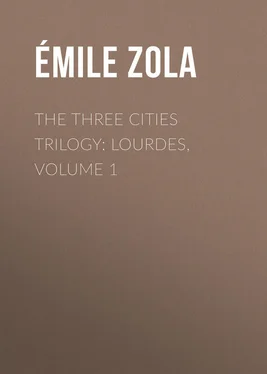Émile Zola - The Three Cities Trilogy - Lourdes, Volume 1
Здесь есть возможность читать онлайн «Émile Zola - The Three Cities Trilogy - Lourdes, Volume 1» — ознакомительный отрывок электронной книги совершенно бесплатно, а после прочтения отрывка купить полную версию. В некоторых случаях можно слушать аудио, скачать через торрент в формате fb2 и присутствует краткое содержание. Жанр: literature_19, foreign_antique, foreign_prose, на английском языке. Описание произведения, (предисловие) а так же отзывы посетителей доступны на портале библиотеки ЛибКат.
- Название:The Three Cities Trilogy: Lourdes, Volume 1
- Автор:
- Жанр:
- Год:неизвестен
- ISBN:нет данных
- Рейтинг книги:4 / 5. Голосов: 1
-
Избранное:Добавить в избранное
- Отзывы:
-
Ваша оценка:
- 80
- 1
- 2
- 3
- 4
- 5
The Three Cities Trilogy: Lourdes, Volume 1: краткое содержание, описание и аннотация
Предлагаем к чтению аннотацию, описание, краткое содержание или предисловие (зависит от того, что написал сам автор книги «The Three Cities Trilogy: Lourdes, Volume 1»). Если вы не нашли необходимую информацию о книге — напишите в комментариях, мы постараемся отыскать её.
The Three Cities Trilogy: Lourdes, Volume 1 — читать онлайн ознакомительный отрывок
Ниже представлен текст книги, разбитый по страницам. Система сохранения места последней прочитанной страницы, позволяет с удобством читать онлайн бесплатно книгу «The Three Cities Trilogy: Lourdes, Volume 1», без необходимости каждый раз заново искать на чём Вы остановились. Поставьте закладку, и сможете в любой момент перейти на страницу, на которой закончили чтение.
Интервал:
Закладка:
However, a more violent jolt of the carriage drew a cry of pain from the girl. "Oh, father," she said, "pray raise me a little! I can't stay on my back any longer."
When M. de Guersaint had helped her into a sitting posture, she gave a deep sigh of relief. They were now at Etampes, after a run of an hour and a half from Paris, and what with the increased warmth of the sun, the dust, and the noise, weariness was becoming apparent already. Madame de Jonquiere had got up to speak a few words of kindly encouragement to Marie over the partition; and Sister Hyacinthe moreover again rose, and gaily clapped her hands that she might be heard and obeyed from one to the other end of the carriage.
"Come, come!" said she, "we mustn't think of our little troubles. Let us pray and sing, and the Blessed Virgin will be with us."
She herself then began the rosary according to the rite of Our Lady of Lourdes, and all the patients and pilgrims followed her. This was the first chaplet – the five joyful mysteries, the Annunciation, the Visitation, the Nativity, the Purification, and Jesus found in the Temple. Then they all began to chant the canticle: "Let us contemplate the heavenly Archangel!" Their voices were lost amid the loud rumbling of the wheels; you heard but the muffled surging of that human wave, stifling within the closed carriage which rolled on and on without a pause.
Although M. de Guersaint was a worshipper, he could never follow a hymn to the end. He got up, sat down again, and finished by resting his elbow on the partition and conversing in an undertone with a patient who sat against this same partition in the next compartment. The patient in question was a thick-set man of fifty, with a good-natured face and a large head, completely bald. His name was Sabathier, and for fifteen years he had been stricken with ataxia. He only suffered pain by fits and starts, but he had quite lost the use of his legs, which his wife, who accompanied him, moved for him as though they had been dead legs, whenever they became too heavy, weighty like bars of lead.
"Yes, monsieur," he said, "such as you see me, I was formerly fifth-class professor at the Lycee Charlemagne. At first I thought that it was mere sciatica, but afterwards I was seized with sharp, lightning-like pains, red-hot sword thrusts, you know, in the muscles. For nearly ten years the disease kept on mastering me more and more. I consulted all the doctors, tried every imaginable mineral spring, and now I suffer less, but I can no longer move from my seat. And then, after long living without a thought of religion, I was led back to God by the idea that I was too wretched, and that Our Lady of Lourdes could not do otherwise than take pity on me."
Feeling interested, Pierre in his turn had leant over the partition and was listening.
"Is it not so, Monsieur l'Abbe?" continued M. Sabathier. "Is not suffering the best awakener of souls? This is the seventh year that I am going to Lourdes without despairing of cure. This year the Blessed Virgin will cure me, I feel sure of it. Yes, I expect to be able to walk about again; I now live solely in that hope."
M. Sabathier paused, he wished his wife to push his legs a little more to the left; and Pierre looked at him, astonished to find such obstinate faith in a man of intellect, in one of those university professors who, as a rule, are such Voltairians. How could the belief in miracles have germinated and taken root in this man's brain? As he himself said, great suffering alone explained this need of illusion, this blossoming of eternal and consolatory hope.
"And my wife and I," resumed the ex-professor, "are dressed, you see, as poor folks, for I wished to go as a mere pauper this year, and applied for /hospitalisation/ in a spirit of humility in order that the Blessed Virgin might include me among the wretched, her children – only, as I did not wish to take the place of a real pauper, I gave fifty francs to the Hospitalite, and this, as you are aware, gives one the right to have a patient of one's own in the pilgrimage. I even know my patient. He was introduced to me at the railway station. He is suffering from tuberculosis, it appears, and seemed to me very low, very low."
A fresh interval of silence ensued. "Well," said M. Sabathier at last, "may the Blessed Virgin save him also, she who can do everything. I shall be so happy; she will have loaded me with favours."
Then the three men, isolating themselves from the others, went on conversing together, at first on medical subjects, and at last diverging into a discussion on romanesque architecture, /a propos/ of a steeple which they had perceived on a hillside, and which every pilgrim had saluted with a sign of the cross. Swayed once more by the habits of cultivated intellect, the young priest and his two companions forgot themselves together in the midst of their fellow-passengers, all those poor, suffering, simple-minded folk, whom wretchedness stupefied. Another hour went by, two more canticles had just been sung, and the stations of Toury and Les Aubrais had been left behind, when, at Beaugency, they at last ceased their chat, on hearing Sister Hyacinthe clap her hands and intonate in her fresh, sonorous voice:
"/Parce, Domine, parce populo tuo/."
And then the chant went on; all voices became mingled in that ever-surging wave of prayer which stilled pain, excited hope, and little by little penetrated the entire being, harassed by the haunting thought of the grace and cure which one and all were going to seek so far away.
However, as Pierre sat down again, he saw that Marie was very pale, and had her eyes closed. By the painful contraction of her features he could tell that she was not asleep. "Are you in great suffering?" he asked.
"Yes, yes, I suffer dreadfully. I shall never last to the end. It is this incessant jolting."
She moaned, raised her eyelids, and, half-fainting, remained in a sitting posture, her eyes turned on the other sufferers. In the adjoining compartment, La Grivotte, hitherto stretched out, scarce breathing, like a corpse, had just raised herself up in front of M. Sabathier. She was a tall, slip-shod, singular-looking creature of over thirty, with a round, ravaged face, which her frizzy hair and flaming eyes rendered almost pretty. She had reached the third stage of phthisis.
"Eh, mademoiselle," she said, addressing herself in a hoarse, indistinct voice to Marie, "how nice it would be if we could only doze off a little. But it can't be managed; all these wheels keep on whirling round and round in one's head."
Then, although it fatigued her to speak, she obstinately went on talking, volunteering particulars about herself. She was a mattress-maker, and with one of her aunts had long gone from yard to yard at Bercy to comb and sew up mattresses. And, indeed, it was to the pestilential wool which she had combed in her youth that she ascribed her malady. For five years she had been making the round of the hospitals of Paris, and she spoke familiarly of all the great doctors. It was the Sisters of Charity, at the Lariboisiere hospital, who, finding that she had a passion for religious ceremonies, had completed her conversion, and convinced her that the Virgin awaited her at Lourdes to cure her.
"I certainly need it," said she. "The doctors say that I have one lung done for, and that the other one is scarcely any better. There are great big holes you know. At first I only felt bad between the shoulders and spat up some froth. But then I got thin, and became a dreadful sight. And now I'm always in a sweat, and cough till I think I'm going to bring my heart up. And I can no longer spit. And I haven't the strength to stand, you see. I can't eat."
A stifling sensation made her pause, and she became livid.
"All the same I prefer being in my skin instead of in that of the Brother in the compartment behind you. He has the same complaint as I have, but he is in a worse state that I am."
Читать дальшеИнтервал:
Закладка:
Похожие книги на «The Three Cities Trilogy: Lourdes, Volume 1»
Представляем Вашему вниманию похожие книги на «The Three Cities Trilogy: Lourdes, Volume 1» списком для выбора. Мы отобрали схожую по названию и смыслу литературу в надежде предоставить читателям больше вариантов отыскать новые, интересные, ещё непрочитанные произведения.
Обсуждение, отзывы о книге «The Three Cities Trilogy: Lourdes, Volume 1» и просто собственные мнения читателей. Оставьте ваши комментарии, напишите, что Вы думаете о произведении, его смысле или главных героях. Укажите что конкретно понравилось, а что нет, и почему Вы так считаете.












